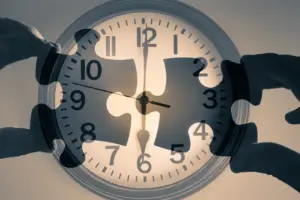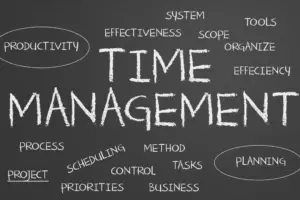We’ve all heard the saying, “time is money.” And while there’s some truth to that, it’s not the whole story. Time is actually much more valuable than money.
The truth is, you can always make more money, but you can’t make more time. And yet, it’s so easy to waste time — and many of us are not even aware we’re doing it!
If this sounds like you, don’t worry. Today’s blog post will be all about time management, specifically on:
- What is considered wasting time
- Why do we waste time?
- What are some time-wasting activities?
- The disadvantages of wasting time (so you know why you do what you do)
- How to avoid wasting your time (so you won’t have any wasted time in the first place!)
So let’s get started…
Recommended Reading:
- How to Stop Caring What People Think So You Can Focus on Making Your Own Success Story
- Creativity Questions and Answers: Questions About Creativity That You Were (Probably) Too Unsure to Ask
- Understanding the Lone Wolf Personality: What It Means, How to Identify It, and More
What is considered wasting time?

The way we spend our time is often seen as a reflection of our productivity. If we’re not working, learning, or simply doing things that don’t matter, then we’re wasting time. But it all boils down to how you define productivity or the goals that you have for yourself.
For example, if you want to become an entrepreneur, then you might consider spending most of your time reading books, writing business plans, networking with other entrepreneurs, and building your personal brand — instead of, say, watching TV or playing video games.
On the other hand, if you’re a creative and you recharge by taking long walks through nature, going to museums, listening to music, or just relaxing at home, then these things could be considered as productive use of your time.
In short, the definition of what constitutes wasting time depends on who you ask. So the best thing to do when it comes to managing your time would be to figure out what works best for you, your lifestyle and your goals.
Why do we waste time?
Let’s face it: we are all humans. And humans as we are, we tend to waste time one way or another. Why? There are many possible reasons why, and here are some of them:
1. You don’t feel good enough about yourself and your work.
At times, you may be opting not to maximize and utilize time because you are afraid that the output of your work may not be the best. You entertain the idea that if the work of others will be better than yours, then the time you exerted in doing it is wasted.
But to tell you frankly, it is not a waste of time. The mere fact that you’ve done something with all your might will never be a wasted effort. Get rid of the “Top 1” mentality if it only makes you feel lazy and demotivated.
2. You unknowingly practice Parkinson’s Law.

Do you often find yourself becoming more productive and efficient at your job when the deadline… is looming?
If so, don’t get too excited. It happens to everyone — and this has something to do with the Parkinson’s Law.
I understand if you’re not well aware of Parkinson’s Law, but it’s kind of a big thing in the world of productivity and time management.
According to Parkinson’s Law, a task will take as long as the time allotted on it. That’s why, when you have a tight deadline for a particular task, chances are, you’ll get pumped up to get that particular task done (even though you’ve been putting off that same task for weeks!)
But there’s a dark side to the Parkinson’s Law, because if you’re working under pressure, you might end up doing things that aren’t necessarily good for you or your work. In other words, you might be tempted to cut corners. This can lead to mistakes, missed deadlines, and even lost opportunities.
But that’s not the only problem with the Parkinson’s Law. Since you often put off work for later (looming deadlines give you that rush, after all), you tend to waste time. It gives you that impression that you are being productive, but in reality, you’re not.
3. You don’t have clarity on what you really want to accomplish.
You know what I mean. Sometimes, you spend hours planning how you’d like to spend your days, but you fail to make any concrete steps towards accomplishing those goals.
This is where procrastination comes into play. Procrastination is defined as “the tendency to postpone tasks that must be completed”. When you procrastinate, you delay working on the things that need to be accomplished. As a result, you waste time.
The reason why people procrastinate is because they lack clarity on their goals. They don’t know exactly what they want to achieve, and they don’t know how to go about achieving it.
What are some time-wasting activities we need to avoid?
Like I mentioned earlier, time-wasting activities all depend on your goals,
1. Mindless internet browsing

“Fifteen minutes on Facebook, and I’m going back to work,” but… you probably ended up spending an hour or two!
And yes, the internet, especially social media platforms, are designed to keep us hooked. If you’d like to use social media wisely, be more mindful of how you use it.
Because let’s face it, using social or the internet (without a clear goal in mind) is one of the most common time wasters. If you’re just looking through news feeds, you could easily waste half an hour. Some people even end up spending hours and hours surfing the web without realizing it!
There is nothing wrong with communicating with friends and having fun browsing the posts on these social media platforms. But remember, using it (and the internet) becomes a waste of time when you are unable to accomplish your supposed tasks because of being too engrossed in browsing.
2. Too much time spent on entertainment.
Watching TV, playing video games, listening to music — all these things can eat up your time if you’re not careful. There’s nothing wrong with entertainment, but it is important that you don’t let it take over your life.
In other words, you need to find a balance between work and play. Only then can you enjoy both at the same time, without compromising one after another.
3. Procrastination
Procrastination is a common habit among students and workers — and for a reason, too. Sometimes, we just don’t “feel” like doing something. We feel lazy, unmotivated, and unproductive. And so, we choose to do nothing instead. This leads to wasted time and some consequences.
The disadvantages of wasting time
Too much time wasted may cost you. How exactly?
Read on to discover some of the disadvantages of wasting time:
1. Having to deal with pointless stress

Wasting time can lead to pointless stress and anxiety. This is because you may worry about not being able to complete what you need to do in time, or not being able to meet deadlines. This can lead to a feeling of being overwhelmed, which can be frustrating and stressful.
2. Procrastination becomes a habit
Wasting time can become a habit, and once it does, it can be difficult to break. This is because you may find yourself putting off tasks that you don’t want to do, or that you’re not sure how to do. This can lead to a cycle of procrastination, which can be hard to break out of.
3. Having to deal with expensive consequences
Wasting time can have expensive consequences. For example, if you’re late for an appointment, you may have to pay a fee. If you miss a deadline, you may lose out on a bonus or a promotion. And if you don’t use your time wisely, you may end up wasting money on things that you don’t need.
[divider width=”full”]
Recommended Reading:
- Make Space for Creativity: How to Find and Cultivate Space for Creativity
- What is Self-Validation and Why Should You Care?
- How to Move Forward During Trying Times and Win Your Battles
[divider width=”full”]
4. You could miss out on opportunities

Wasting time can also mean that you miss out on opportunities. For example, if you’re not working on your career, you may miss out on a chance to get a promotion or a raise. Or that delay could cost you a client. If you’re not careful, you may find that your opportunities are limited because of the time you’ve wasted.
5. Discouragement may creep in
Wasting time can also lead to discouragement. This is because you may feel like you’re not accomplishing anything, or that you’re not doing as well as you could be. This can be frustrating and may make you less likely to want to try new things or take on new challenges.
6. The feeling of getting behind
Wasting time can also make you feel like you’re getting behind. This is because you may compare yourself to others who are more successful or productive. This can lead to feelings of insecurity and inadequacy. And it may make you less likely to take risks, which can limit your opportunities for growth.
7. Having to skip self-care frequently

Wasting time can also lead to skipping self-care. This is because you may not have time for things like exercise, relaxation, or healthy eating. This can lead to a decline in your physical and mental health. And it may make you more likely to get sick or injured.
8. Exerting too much effort without yielding satisfactory results
Wasting time can also mean that you’re exerting too much effort without getting the results you want. This is because you may be working on something that’s not worth your time, or that you’re not doing it correctly. This can lead to feelings of frustration and discouragement. And it may make you less likely to want to continue trying .
9. Poor decisions
Wasting time can also lead to poor decisions. This is because you may not have enough time to think things through, or you may be rushed into making a decision. This can lead to regret or buyer’s remorse. And it may make you more likely to make impulsive decisions in the future.
10. Disorganization

Disorganization is often a result of too much mismanaged time. When you don’t have enough time to get things done, it can lead to a feeling of being overwhelmed. This can cause you to lose track of what’s important and what’s not. And it may make you less likely to want to try to organize your time in the future.
People Also Ask | Frequently Asked Questions About the Disadvantages of Wasting Time
What are the signs of Procrastination?
Lack of motivation, the tendency to put things off, and missing deadlines are signs of procrastination.
What are the costs of missing deadlines?
You may end up paying more for housing, keep incurring late registration fees, or penalties if you keep on missing deadlines.

What is Good Time Management?
When time is tight and pressure is high, having a good sense of time management allows you to work smarter instead of harder.
[divider width=”full”]
Recommended Reading:
- How to Increase Personal Productivity in the Workplace: 11 Tips to Help You Accomplish More by Doing Less
- Why Is It Good To Have a Positive Mindset? 14 Good Reasons Why
- Get Rid of Negative Thoughts: How to Cleanse Your Mind from Negativity
[divider width=”full”]
Final Thoughts About the Disadvantages of Wasting Time

As you can see, wasting time can have many disadvantages. However, there are ways to manage your time so that you don’t waste it. For example, you can make time for the things that matter most to you, and you can prioritize your activities so that you don’t waste time on the things that don’t matter.
You can also set aside time to work on projects that are important to you. You can do this by scheduling your time, and you can also create to-do lists. Or, it could be as simple as setting an alarm clock to let you know that it’s time to start focusing.
You can also plan ahead. For example, you can schedule your time in advance, so that you can avoid procrastination. You can also be more efficient when you’re working on something.
I hope that this post has helped open your eyes to the reality of the disadvantages of wasting time. And I hope that you’ll use this knowledge to avoid wasting time in the future.
And one last thing, if you find this useful, don’t forget to share it with your friends!
Thanks for dropping by and I hope to see you next time!
Disclaimer:
This post may contain affiliate links. Meaning, if you click on one of the product links, I will earn a small commission at no cost to you. Thank you for supporting Creativity Mesh.





